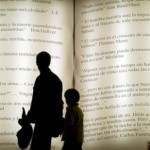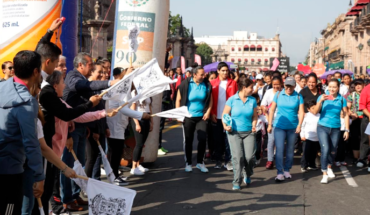
There are a couple of questions that have been with me almost for life. “How do you prefer us to call it?” This is the first one and for her I have a simple answer: “Whatever your love is.” It doesn’t bother me that beyond the Andes they call me Juan. It seems to me that it is a reasonable name as is Joseph’s: both are biblical from a time when there was no investigative journalism, so we can assume some respectability in them. Charles or Anthony are perhaps not so venerable appendages. In a way, they involve the ambitions of parents who dreamed of having kings and emperors as children. But the repertoire of my names extends much further: Carlos, Juanito, the Esqüis, Profe, Johnny. El Jota and Juanqui “carry it”: it is what my partner, my daughters and my son call me, while throughout my life I was “El Chico” – not in vain was the youngest in the maternal home. Anyway.
I am amazed that it can be so because through names relationships are built, loves and heartbreaks are put together. La Tencha, Evita, El Choche, El Chicho or Che have much deeper sympathies than Hortensia, Eva, Jorge, Salvador or Ernesto. Every relationship is unique and deserves that uniqueness. The worst thing that could have happened to the names is to have been caught by the baptismal acts, first, and by the Civil Registry, later. The fiber that best speaks of people and their relationships is the one that is braided through earned names rather than inherited ones.
The second question I’ve become accustomed to is, “How do you pronounce your last name?” Here the answer is: “The best suits you.” From Esqiubidubidu to El Kiwi, my surname goes through multiple transformations. There is no correct pronunciation. There couldn’t be. Among human beings words are spoken and then understood. That’s what matters, isn’t it? It’s not the kind of last name that people laugh at a lot. Rather there is a certain respect for this European-looking morpheme. Mr. Skewes would not sound as weird as Mr. Iglesias. However, it would be uncomfortable for me to be called that! I cannot forget Mister Jara, a short story by Gonzalo Drago, which puts us in front of one of the deepest wounds of our society. Mister Jara, you will recall, was the foreman who felt gringo, unlike the workers, whom he subdued without sympathy. In Mister Jara – as in El Padre, by Olegario Lazo Baeza – the local version of La Malinche is embodied, especially in those who “swell with great care serving the greed of the foreigner”.
“Mañungo, Mañungo!” he greeted his son, an Army officer, the peasant father who comes to see him at the barracks, bringing a basket of food: “The officer greeted him coldly,” Lazo’s account continues: “The peasant’s arms fell off… The lieutenant took him out of the barracks in disguise. In the street he blew in his ear: “What an occurrence of his!… Come and see me!… I have service… I can’t go out.”
I find it difficult to explain to my interlocutors that my grandparents came escaping misery the moment the business ends in their payments. And they migrate, to these lands, to become the Americas, like so many other Europeans, not knowing that some of their descendants would strive to stigmatize those who came later in search of bread and shelter. On the maternal side I was emphasized for a long time that, although the pronunciation of my second surname ended in “ch”, it was written with “ce and an accent” (the word tilde was not used at the time). Anti-Semitism, along with contempt for the indigenous, ran through the fabrics of family genealogy. Suddenly I was recognized as a Croatian descendant, but I could not feel any sympathy with a nationalist horde whose rise to power left behind a trail of blood. I feel more affinity towards Yugoslavia as an idea of a country than to any project founded on an outdated racist or nationalist idea.
I had a stepfather to whom I owe tremendous affection. I could have changed my last name. It didn’t occur to me. I could have called myself Juan Carlos Fenner, but the German – or rather the stereotype of the German – was not particularly attractive to me: this image between Bavarian and Tyrolean combined with a Hitlerian nuance produced, of course, a distance from that possibility. It was not surprising that while my dear stepfather was furrowing his son, my heart was glad when in the middle of Alameda a passerby, glued to his transistor radio, announced the goal with which England beat Germany, winning the Jules Rimet Cup in 1966. It goes without saying that that goal, the third, is only comparable to that of Maradona in front of the mIsma England years later: they must be considered as the most “tricks” in the history of football. Later he would learn that Germany was more than just Bavarian customs and its gastronomy (including beer). But at the age of twelve, philosophy, art and cinema count for little.
I did not change my name or surname but there have been so many ways to enunciate or pronounce them that, each of them, leaves engraved in my memory the memory of my interlocutor or interlocutor. It was not necessary for me to use names or surnames for any purpose other than strictly administrative. It was not necessary to move from Iglesias, to Schindler or Weber and then to Leal, depending on the circumstances. Names were born from relationships and not the other way around. I imagine that Juan Carlos arose from some family negotiation (and the result was not the luckiest), but I did not claim, nor did I rectify whoever called me Juan.
Of all the names I have received, Don Carlitos is the one that perhaps best reflects the complexity of living in a society that, apart from being classist, is careerist. I got that particular name while I lived in a camp in Pudahuel. The “gift” had some of the respect that is given to the affluent classes. The Carlitos, on the other hand, made it possible to live the difference through affection, affection. Life transformed that nickname into Don Bota, which is what granddaughter calls me (given the difficulty that, in Portuguese, the pronunciation of the jota poses). Don Carlitos and Don Bota are pure love and, as Violeta Parra reminds us, “Love with its cares / The old man becomes a child / And the bad only affection / It makes him pure and sincere”.
The content expressed in this opinion column is the sole responsibility of its author, and does not necessarily reflect the editorial line or position of El Mostrador.





